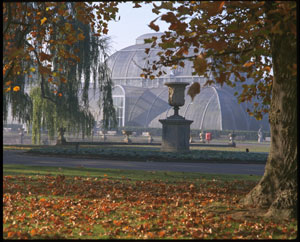- 25 January 2008
University and Royal Botanic Gardens, Kew cultivate new research partnership

The Palm House at Kew Gardens
Helping to save the world's endangered plant species and finding new medicinal uses for plants are among the ideas being considered for an exciting new research collaboration between the University of Sussex and the Royal Botanic Gardens, Kew (RBG Kew).
The new partnership, to be formalised at a special event at Kew Gardens on Thursday, 31 January, is the latest development in a growing relationship between RBG Kew and the University. For example, Sussex postgraduate students in Plant Conservation are taught by Sussex staff and by staff at Kew's Millennium Seed Bank in Wakehurst Place near Haywards Heath.
Now, both institutions want to extend this relationship into new areas that will benefit science and research between RBG Kew and the University and also the wider community and the regional economy.
Professor Bob Allison, Pro-Vice-Chancellor for Research at University of Sussex, says: "This collaboration provides ample opportunity to explore the possibilities not just of plant science and conservation, but wider areas of Kew's heritage and archive material. We're sowing the seeds for exciting new research and I anticipate a fruitful partnership."
Professor Hugh Pritchard, a member of Kew's Senior Science Group, says: "The prospect of adding value to both organisations through collaborative, multidisciplinary science is truly exciting for all involved in this initiative."
Academics at Sussex have also identified research areas they would like to collaborate on with scientists at RBG Kew, including:
- Conservation of plant species at risk of local or global extinction, both in situ and ex situ;
- The ecology and practice of restoration of plant populations and plant communities;
- Analysis and meta-analysis of large databases, for example on the seed biology and germination behaviour of plant species, and on physiological and biochemical properties (e.g. salt tolerance);
- Metabolomics (global study of all small molecules), and its application to studies of seed changes during germination, and root recognition behaviour;
- Exploration of the medicinal and pharmaceutical potential, and allergenic properties, of plant species.
Other ideas outside scientific research would involve RBG Kew's rich archival resources and academics with interests in art history, heritage and the development of Higher Education initiatives.
To mark this development, University of Sussex Vice-Chancellor Professor Michael Farthing and the Director of the Royal Botanic Gardens, Kew Professor Steve Hopper, will sign a special Memorandum of Agreement at Kew Gardens.
Following the signing, there will be a reception for invited guests, including Lord Attenborough (Chancellor of the University of Sussex), MPs and representatives from key funding bodies, including Defra and The South East England Development Agency (SEEDA). Guests will also be able to tour the Jodrell Laboratory and the Herbarium at Kew Gardens.
Notes for editors
- Following the signing by the University of Sussex Vice-Chancellor Professor Michael Farthing and the Director of the Royal Botanic Gardens, Kew Professor Steve Hopper, there will be a reception from 12.45pm to 1.30pm and an opportunity to tour the Herbarium and the Jodrell Laboratory, which undertakes pure and applied research on micromorphology, biological interactions, conservation genetics and molecular systematics.
- Following the event there will be the first meeting of a Steering Group to promote developments between the two institutions.
University of Sussex Press office contacts: Maggie Clune and Jacqui Bealing. Tel: 01273 678 888 or email press@sussex.ac.uk
For information about University of Sussex, see www.sussex.ac.uk
The Royal Botanic Gardens, Kew is internationally respected for its outstanding living collection of plants and world-class herbarium as well as its scientific expertise in plant diversity, conservation and sustainable development in the UK and around the world. Kew Gardens is a major international visitor attraction and its 132 hectares of landscaped gardens has over one million visitors per year. Kew was made a UNESCO World Heritage Site in July 2003 and represents over 250 years of historical landscape.
For further information please visit www.kew.org.
Journalists can visit www.kew.org/press or contact Anna Quenby, Bronwyn Friedlander, Catherine Owen or Bryony Phillips in the RBG Kew Press Office. Tel: 020 8332 5607, email: pr@kew.org.
The Millennium Seed Bank is the largest wild plant seed bank in the world. The Millennium Seed Bank Project is one of the most ambitious global conservation projects. By 2010, RBG Kew and its partners will have collected and conserved seed from 10 per cent of the world's wild flowering plant species (c.30, 000 species). The Millennium Seed Bank has the capacity to store up to half the world's wild flowering plant species and already holds 96 per cent of the UK's flora. Species for collection and conservation are prioritised by Kew's partners: all are endangered, rare or of potential economic value. The Millennium Seed Bank has been made possible with generous funding from the Millennium Commission, the Wellcome Trust and Orange plc and other donors; however, it has no secured funding beyond 2010. For further information please visit www.kew.org/msbp.
MSB press office contact: Sharon Buckley. Tel: 01444 894018 or email msb@kew.org